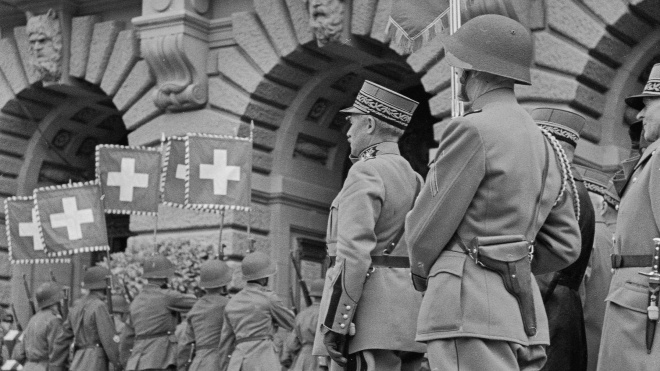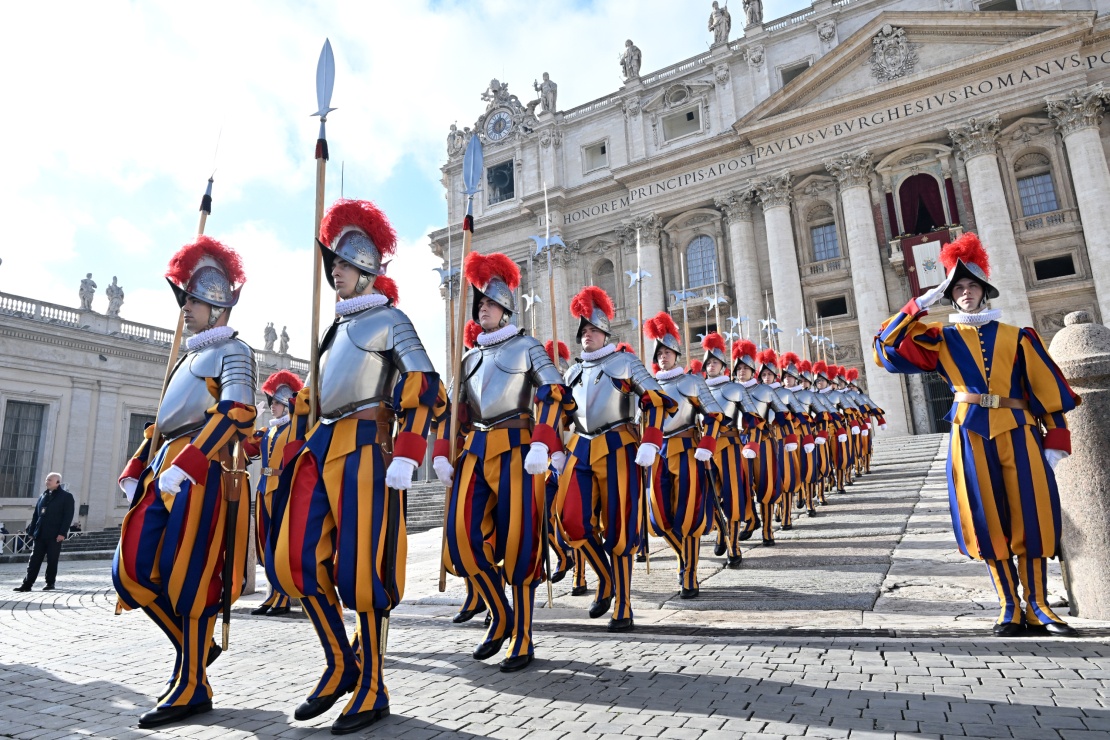From the “golden age” of Swiss mercenaries to “eternal neutrality”
The history of the Swiss state began on August 1, 1291. It was then that the three local communities-cantons of Schwyz, Uri and Unterwalden concluded a defensive alliance against the Holy Roman Empire under the rule of the Habsburg dynasty. In 1315, the Swiss defeated the overwhelming Habsburg army and their allies. After that, they were joined by other local communities, which united in the confederation of cantons.
At the beginning of the 15th century, the Swiss Confederation became so strong that it went on the offensive. Over the next century, the Swiss captured the lands of the Holy Roman Empire, French kings, and Italian dukes. The territory of the Confederation expanded to 13 cantons, and the Swiss gained the fame of the best warriors, they were hired by all European rulers.
Everything changed after the Battle of Marignano in September 1515. Then the French and Venetians, thanks to their artillery, completely crushed the Swiss infantry, dispelling the myth of its invincibility. Since then, the Swiss Confederation has abandoned wars for new territories and focused on defense. The last time the Swiss took part in European wars was after the conquest of the country by Napoleon Bonaparte in 1798. After the defeat of Napoleon, the Swiss revived their Confederation, which at that time consisted of 22 sovereign cantons. Today, the Swiss Guard of the Vatican, which guards the residence of the Pope, reminds of the tradition of military mercenaries.
Swiss Guards outside St. Peterʼs Basilica in the Vatican on December 25, 2022.
Getty Images / «Babel'»
After the Napoleonic wars, the great powers began to redraw the map of Europe at the Congress of Vienna in 1814 and concluded with the Paris Peace Agreement in 1815. The Swiss question was one of the most difficult. On the one hand, all major European powers sought to attract Switzerland to their side because of its strategic location in the Alps. On the other hand, the Swiss used to fight a lot in different battles for different countries and no longer wanted to take sides. Therefore, they proposed a third option — neutrality. In practice, this meant that Switzerland would not participate in armed conflicts between countries and would not provide weapons to either side. The European states agreed to this and guaranteed the “eternal neutrality” of Switzerland.
In the future, Switzerland only strengthened its neutral status. In 1863, Swiss businessman Henri Dunant founded the private organization International Committee for Aid to the Wounded. It called for the development of international treaties that would guarantee the safety of neutral doctors and hospitals for the wounded on the battlefield. This idea was supported by the Swiss government, which in 1864 invited the governments of European and American countries to an international conference in Geneva. As a result, the Geneva Convention for the Amelioration of the Fate of the Wounded on the Battlefield was adopted, as it became the first document enshrining the humane customs of war in Europe. In 1901, Dunant received the first Nobel Peace Prize. And the organization founded by him is now known all over the world under the name of the International Committee of the Red Cross.
Medical mission of the Swiss Red Cross on the Eastern Front during World War II, 1941.
Getty Images / «Babel'»
Armed neutrality during the world wars
During the First World War, Switzerland followed a policy of neutrality. However, after the start of the war in August 1914, more than 250,000 people were mobilized. They were sent to cover the borders just in case. After all, Switzerland bordered several countries from warring blocs: with Germany and Austria-Hungary from the Quadruple Alliance and with France and Italy from the Entente. However, nobody was going to violate Switzerlandʼs neutrality then, so it gradually reduced the number of troops on its borders.
The border between Switzerland and France during the First World War. French border guards in the foreground, Swiss in the background, June 19, 1917.
Getty Images / «Babel'»
After the war, the League of Nations appeared — the first international intergovernmental organization that was supposed to promote peace and security in the world. It confirmed the neutrality of Switzerland and even chose Geneva as her headquarters. Switzerland itself also joined the League of Nations. However, it regretted this very soon, because it began to be inclined to “differential neutrality”, for example, to support economic sanctions as non-military methods of peacekeeping.
Meeting of the League of Nations in Geneva, 1920.
Getty Images / «Babel'»
During the Second World War, the situation became much more difficult for Switzerland. At first, the French command proposed to send troops to Switzerland and include Swiss army into French forces. And in the middle of 1940, the country found itself surrounded by Germany and its allies. Even then, Hitler planned an invasion of Switzerland. German planes increasingly violated its airspace and staged provocations, and ground troops came close to the Swiss borders.
In these conditions, the Swiss command developed a defense strategy called National Redoubt. According to this plan, more than 400,000 soldiers were to withdraw to the mountains — to pre-arranged fortifications, and from there wage a guerrilla war against the invaders. But in the end, Germany never decided to invade.
Swiss soldiers in the mountains during the celebration of the Foundation Day of the Swiss Confederation amid the threat of a German invasion, August 1, 1940.
Getty Images / «Babel'»
After the initiative was intercepted by the anti-Hitler coalition in 1943-1944, Allied aviation began to harass Switzerland. This was especially true of American pilots who not only flew into Swiss territory, but also mistakenly bombed Swiss cities several times. In response, the Swiss aviation began to force the offending planes to land, and sometimes even shot them down. After World War II, the US apologized and paid the Swiss more than $18 million in compensation.
Claims to “flexible” neutrality
Objections to the neutrality of Switzerland began during the Second World War. Surely, Germany didnʼt attack it not because it was afraid of the Swiss defense strategy. The German forces greatly outnumbered the Swiss, and any one of the German tank regiments had about three times as many combat vehicles as the entire Swiss army.
Switzerland had to make concessions in order to become more useful to Germany as a partner than as an enemy. The Swiss allowed German and Italian goods, including military goods, to be transported through their territory. They agreed to sell gold and other precious metals to the Germans for Reichsmarks and gave them a large credit in Swiss francs. According to the agreement with the Nazis, Switzerland did not allow nearly 25,000 Jewish refugees into its territory.
A Swiss railway junction in the Alps used by Germany to transit its goods to Italy, 1943.
Getty Images / «Babel'»
Subsequently, new claims arose. Switzerland was accused of holding billions of dollars worth of Nazi gold in its banks. Added to this were accusations that Swiss banks refused to return the assets of Holocaust victims to their descendants. Switzerland had to apologize for all this until the 1990s. In August 1998, Swiss banks agreed to pay $1.25 billion in compensation to the heirs of victims of the Nazi genocide.
Zurich bank security guard Christoph Meili, who discovered that the bank was destroying World War II documents and made the information public in 1997.
Getty Images / «Babel'»
As for participation in international organizations, Switzerland also had to show flexibility here. The country is not a member of NATO, but has joined some of the Allianceʼs programs and helped peacekeepers in Bosnia and Herzegovina. And during the Cold War, it had secret agreements with NATO countries in case of a new armed conflict in Europe.
Switzerland was one of the founding members of the European Free Trade Association in the 1960s. However, it never joined the European Union, although it has a number of cooperation agreements with it and is part of the visa-free Schengen zone.
After World War II, the League of Nations was replaced by the United Nations. But Switzerland did not want to fully join the organization, fearing that it would again be forced to support economic sanctions. However, it became a member of some of its institutions: the International Court of Justice, the Office of the United Nations High Commissioner for Refugees, UNESCO. In the 1990s, Switzerland revised its position and began to join international UN sanctions, and in 2002 became a member of the organization. Switzerland justifies this flexibility by the fact that it doesnʼt violate the main historical principles of its neutrality: not to participate in wars, not to join any military alliance, and not to supply weapons to anyone.
Swedish Prime Minister Hans Joran Persson, left, speaks with Swiss Defense Minister and Vice President Adolf Ogy, right, before the start of the Euro-Atlantic Partnership Council meeting at the NATO summit in Washington, April 25, 1999. After the start of a large-scale Russian invasion of Ukraine in 2022, Sweden reconsidered its neutral status and applied to join NATO.
Getty Images / «Babel'»
Translated from Ukrainian by Anton Semyzhenko.
Hopefully, Switzerland will figure out how to help Ukraine without violating its own neutrality. And you don’t need to invent anything to help Babel, it can be done very simply: 🔸 in hryvnia 🔸 in cryptocurrency 🔸 via Patreon 🔸 or PayPal: [email protected].


